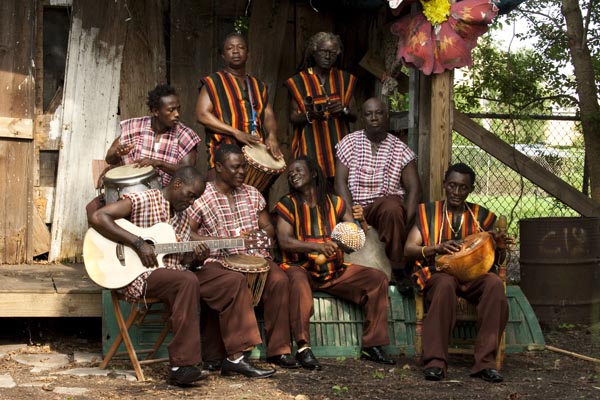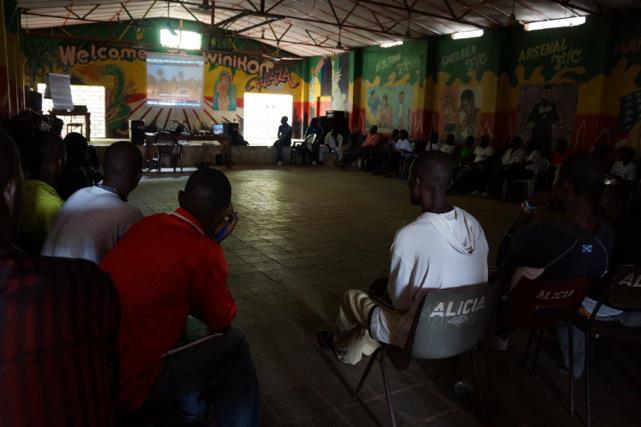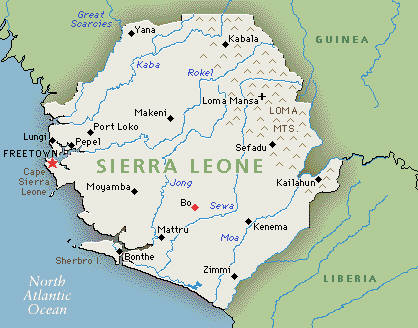Sierre Leone’s Refugee All Stars are featured on the Wan Fambul/One Family album performing ‘Global Threat’Family Album: True Reconciliation Begins
Wan Fambul/One Family celebrates Catalyst for Peace's grassroots peacebuilding in Sierre Leone and groove-oriented creative spirit
Seven years since the last bullet was fired, a decade of fighting in Sierra Leone found resolution as people stood and spoke. Some had perpetrated terrible crimes against former friends. Some had faced horrible losses: loved ones murdered, limbs severed. But as they told their stories, admitted their wrongs, forgave, danced, and sang together, true reconciliation began.
This is the story of "Fambul Tok" (Krio for "family talk"), and the world is hearing it because of Catalyst for Peace. Established in 2003, Catalyst is a Portland, Maine-based private foundation that identifies and supports community-based peacebuilding work around the world. Its current agenda focuses on post-conflict Africa, and also on the ways moderate religious voices are mobilizing for peace. It is committed to finding the stories that aren’t being told, learning from the lessons of local cultures and supporting their role in peacemaking, and disseminating these lessons to a global audience. Catalyst seeks out and supports grassroots peacebuilding that springs from local practices and culture: from the songs and tales, from the town meetings and ceremonies, from the liberating truth-telling, apology and forgiveness that end bloodshed, enmity, and endless cycles of bitterness.
Ex-combatants gather to watch the Fambul Tok documentaryNow, Catalyst is celebrating these breakthrough moments along with the creative spirit that can accomplish the seemingly impossible. This spirit dwells in music: Wan Fambul/One Family unites the diverse voices of artists from conflict zones. The result is a high-energy, urgent call for forgiveness and deep dialogue from edgy DJs and soulful singer-songwriters, from hard-hitting reggae outfits to transnational pop explorers. The groove-powered compilation features tracks by global music heavyweights Vieux Farka Toure, Idan Raichel, Vusi Mahlasela and Dengue Fever, along with other promising groups and solo artists such as Bhi Bhiman.
"The lessons we are learning from Sierra Leone are universal lessons," says Libby Hoffman, founder and president of Catalyst for Peace. "The processes are applicable in other places and settings. What people in Sierra Leone are illustrating, artists in other communities--like the ones on Wan Fambul--are capturing and expressing in their own meaningful ways."
The Iranian sister duo Abjeez performs 'Biyaa' in London 2010. Abjeez is featured on the Wan Fambul/One Family album. '...bright, melodic global pop that address social issues with wit and grace.'Wan Fambul serves as a sonic companion and counterpoint to Catalyst's Fambul Tok (see www.FambulTok.com), a stirring documentary film and book on the groundbreaking work of Fambul Tok in Sierra Leone that brings former adversaries, perpetrators, and victims together for community discussions in a traditional setting. Fambul Tok had its world television premiere February 22nd on EPIX cable channel.
The benefit album is available for a donation at www.FambulTok.com. All proceeds go directly to support the grassroots peacebuilding work of Fambul Tok in Sierra Leone.
"We believe that music is the fastest way to pass the message," says Sierra Leonean pop icon Bajah whose two tracks with his Dry Eye Crew ("We Na Wan Fambul," "Gun Thing") emit an upbeat optimism in service of preventing election violence. "Music can go where you can't go. Music is circulating and it can be in more than one place, and that's the power that we've got as musicians. The power to preach positive music, to give voice to the voiceless."
An interview with Sara Terry, director of the award winning documentary Fambul TokHoffman, like Bajah, has been working to do just that for nearly ten years. A former academic, Hoffman longed to tell the world about the bold yet unsung community-based peacebuilding efforts she had seen across the world, and particularly in some of the most tragic conflict zones in Africa, and to help these efforts grow in strategic impact. She eventually teamed up with visionary Sierra Leonean human rights activist John Caulker, who had an unprecedented plan to bring people together at the most intimate level, using long-held traditional meetings, ceremonies, dances, and musical practices to foster spaces for forgiveness. The forgiveness that seemed to elude communities, despite national efforts, courts, and truth commissions organized to deal with the aftermath of a brutal civil war. Through their collaboration, Fambul Tok came into being and quickly began holding community meetings.
Hoffman was astonished when she witnessed her first ceremony early on in the Fambul Tok program. In a tiny village in the Sierra Leonean hinterlands, people gathered around a fire in the center of a dusty circle. "No one knew what was going to happen, who was going to come forward," Hoffman remembers. "A man stood up who only had one arm and told his story of how a rebel soldier had cut it off. The chief said, 'Do you see the person who amputated it?' He did, and the other man stepped forward and apologized. They hugged, and the man forgave him. At first I thought, 'They must be dramatizing it.' But as this happened again and again, I realized that people were not acting. This was in fact the first time they'd ever talked about what had happened to them. Not only were they telling their stories fully and truthfully, they were forgiving. Someone would admit and apologize, and their victim would openly forgive them."
Forgiveness and a new sense of unity in a fractured community are forces the artists on Wan Fambul all hope to channel. "Most conflicts are based on a lack of understanding and communication," explains the globally-inflected Iranian pop duo Abjeez. "Music creates unanimity. No matter what religious or political view we might have, music resonates in the very same way in our bodies."
Fambul Tok and Community Healing in Sierra Leone: Introduction to the groundbreaking Fambul Tok (Family Talk) program of community reconciliation in Sierra Leone, the flagship program of Fambul Tok International (FTI). FTI Executive Director John Caulker talks about the origins of the work in Sierra Leone, illuminating a unique approach to bringing justice and peace after civil war. Produced by Catalyst for Peace.And forgiveness has a power that defies high-level politics, the talks and treaties that too often seem unable to bring about peace alone. As Israeli Idan Raichel, who collaborates with Malian blues innovator Vieux Farke Toure on "Say God," notes, "Peace will not be reached by signing a peace treaty between our great leaders and their great leaders. Ultimately, it will be achieved through knowing people from other countries as neighbors-because a neighbor is not your enemy."
Dengue Fever performs 'Uku' at the Troubadour in Los Angeles. Featured on the benefit album Wan Fambul, the six-member band from Los Angeles combines Cambodian pop music and lyrics with psychedelic rock. Dengue Fever was formed in 2001 by brothers Ethan and Zac Holzman after Ethan returned from a trip to Cambodia. Lead singer Chhom Nimol was discovered in a nightclub in the Little Phnom Penh area of Long Beach. Other band members include Senon Williams, Paul Smith and David Ralicke."All these musicians reveal the creative power that can't be squelched, the same power that we encountered in Sierra Leonean villages. Decades of war and poverty and systematic disenfranchisement can't kill it," Hoffman says. "The artists on Wan Fambul are expressing the same reality: making music affirms the creative force that is the basis of what heals and unites us."
The Wan Fambul Artists:
Abjeez: Iranian sister act makes bright, melodic global pop that address social issues with wit and grace.
Bajah + Dry Eye Crew: Sierra Leone's stadium-packing answer to Sean Paul thanks to joy-filled, Africa-rooted hip hop.
Bhi Bhiman: Soul vocals and chilling storytelling, Sri Lankan Tamil roots and a St. Louis upbringing meet in thoughtful songs.
Bombino: Spare yet lush Tuareg guitar heroism from Niger.
Dengue Fever: LA-born band explores vintage Cambodian psychedelia guided by the pure, elegant voice of a Cambodian singer with a serious pedigree.
Idan Raichel: Groove-laden international hit maker known for his catchy songs, collaborative energy, and calls for peace and tolerance.
Mashrou' Leila: Passionate young Lebanese rock experimenters defy social mores and conventional notions about Arabic music.
Noble Society: Bounding between reggae and hip hop, Noble Society's Guyanan front man and diverse band insist on self love, community, and justice.
Saba Saba: A veteran MC with a massive following in Uganda and among hip DJs, Saba Saba pioneered rap in Luganda and fought for cultural revival while fighting corruption and violence.
Sierra Leone Refugee All-Stars: Founded in a refugee camp, the All-Stars wound up inspiring the world with their clever, intense grooves.
Vieux Farka Toure: Son of the revered Malian bluesman, Vieux carves out his own path with compelling vocals and striking guitar work.
Vusi Mahlasela: A powerful, deep blue South African voice rich with hope and creativity, backed with whirling Afroblues guitar and delicate bursts of percussion.
Courtesy World Music News Wire
Founder/Publisher/Editor: David McGee
Contributing Editors: Billy Altman, Laura Fissinger, Christopher Hill, Derk Richardson
Logo Design: John Mendelsohn (www.johnmendelsohn.com)
Website Design: Kieran McGee (www.kieranmcgee.com)
Staff Photographers: Audrey Harrod (Louisville, KY; www.flickr.com/audreyharrod), Alicia Zappier (New York)
E-mail: thebluegrassspecial@gmail.com
Mailing Address: David McGee, 201 W. 85 St.—5B, New York, NY 10024






